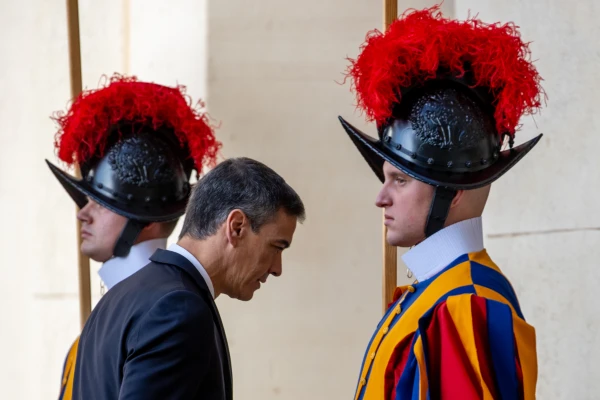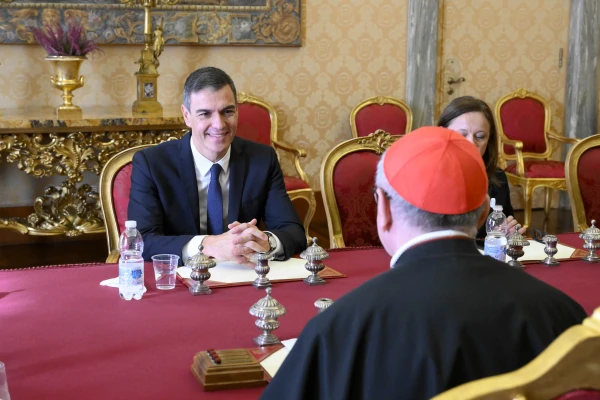The President of the Government of Spain, Pedro Sánchez, has invited Pope Francis to visit the Canary Islands, while promoting his agenda for the secularization of the Valley of the Fallen in a subsequent meeting with Cardinal Pietro Parolin.
The invitation to the Holy Father has been made “in view of the interest that the Holy See has in knowing the reality of the Canary Islands people, the solidarity of the Canary Islands people with this immigration that is arriving on their shores”, as Sánchez himself has detailed in a appearance before the media in Rome.
Receive the main news from ACI Prensa by WhatsApp and Telegram
It is increasingly difficult to see Catholic news on social media. Subscribe to our free channels today:
Sánchez has also considered that the visit to the Vatican has been “very positive for the interests of the Government of Spain and our relationship with the Holy See and the Catholic Church.”

The Spanish president was received by the Holy Father at 9 a.m. (local time) this Friday at the Apostolic Palace of the Vatican, where they were able to talk for 35 minutes, as reported by the Press Office of the Holy See.
The main topics of conversation revolved around achieving peace in the face of ongoing war conflicts, especially in Ukraine and the Holy Land, and the issue of migration.
In this regard, Sánchez has assured that Pope Francis has shown himself to be “very interested in the immigration policy that this Government has developed in the last six years.”

At the end, the President of the Executive met with the Secretary of State, Cardinal Pietro Parolín, to address other issues related to the ideological agenda of the coalition government formed by socialists and communists.
Specifically, the report on sexual abuse within the Catholic Church prepared by the Ombudsman at the request of the Congress of Deputies and criticized by the Spanish Episcopal Conference (CEE).
There was also talk of the Government’s plans for the “resignification” of the Valley of the Fallen, contained in the Democratic Memory Law, which implies the expulsion of the Benedictine community that has lived in the place since its foundation. This is an interference that has also been rejected by the president of the EEC, Mons. Luis Argüello.
“From the Government of Spain we have expressed our absolute willingness to reach an agreement with the Catholic Church to resolve these two issues. The will of the Government of Spain is to reach an agreement and to effectively implement the recommendations of the Ombudsman’s report,” Sánchez explained.
These recommendations were rejected by the EEC in a statement published last April in which it was stressed that “the Church cannot accept a plan that discriminates against the majority of victims of sexual abuse” and that “parts from a condemnatory trial.” of the entire Church, carried out without any type of legal guarantee, a public and discriminatory accusation by the State.”
Despite this, the ecclesiastical authorities expressed their willingness to collaborate “in the areas of their responsibility and competence, but always to the extent that it addresses the problem as a whole.”
The policies of the Governments of Pedro Sánchez have been characterized by colliding “head-on with the Christian conception and the Magisterium of the Church”, as denounced by more than 100 personalities from the Catholic sphere before the first meeting held by Pope Francis and Pedro Sánchez in 2020. .
Among them is the approval of the Euthanasia Law, the promotion of LGTBI ideology, eliminating the crime against religious feelings, prohibiting the public prayer of the Rosary or legislating to dissolve the family institution, especially the large family.
The Press Office of the Holy See has stated that the meeting at the Secretariat of State took place “in an atmosphere of cordiality” that allowed “the exchange of points of view on bilateral relations and issues of common interest, in order to foster “a fruitful dialogue between the local Church and government authorities, as well as between the different components of civil society.”

